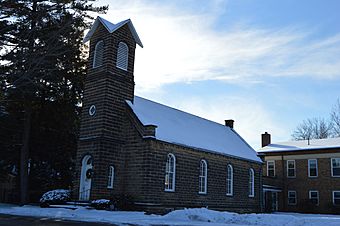Independence Presbyterian Church facts for kids
Quick facts for kids |
|
|
Independence Presbyterian Church
|
|

Northern side and front
|
|
| Location | State Route 21, Independence, Ohio |
|---|---|
| Area | Less than 1 acre (0.40 ha) |
| Built | 1853 |
| Architect | Jacob Merkle |
| NRHP reference No. | 77001053 |
| Added to NRHP | April 13, 1977 |
The Independence Presbyterian Church is a very old church building in Independence, Ohio, United States. It was built in the 1850s. This stone church was once home to a group of people whose lives depended on local mining.
After a quiet period, the church became active again in the 1920s. It was recognized as an important historic site in the 1970s. Today, it stands as a reminder of the area's past.
Contents
What the Church Looks Like
The Independence Presbyterian Church is mostly made of stone. Its base and walls are built from strong stone. The roof is covered with slate, a type of rock that is very durable.
Building Design
The church has a simple, rectangular shape. It has a pointed roof, which is called a gabled roof. At the front of the church, there is a square tower. This tower holds the main entrance where people go inside.
Tower Features
The top part of the tower has a belfry, which is a space for bells. This belfry has special slanted openings called louvers. These help protect the bells from weather while letting their sound out. The church's design is quite plain, with not many fancy decorations.
The Independence Slab
However, there is one special feature on the back wall. It has a unique carving known as the Independence Slab. This carving is a type of petroglyph, which is an image carved into rock.
History of the Church
A group of Presbyterian people first formed their church community in 1837. But it took almost 20 years before their church building was constructed. The church was finally built in 1855.
Building and Economy
A person named Jacob Merkle created the design for the church. At that time, the local economy relied heavily on stone quarries nearby. The church community also depended on these quarries. When the quarries closed in 1905, the church group became inactive.
New Beginnings
The church building was empty for 20 years. Then, in 1925, another Presbyterian group started using it. As this new group grew, they needed a bigger space. A new church building was finished next door in 1963.
Since then, the old stone church is mostly used for special events. The church community is still very active today. It is part of the Western Reserve Presbytery of the Presbyterian Church (USA).
A Historic Landmark
In 1977, the old Independence Presbyterian Church was added to the National Register of Historic Places. This means it was recognized as an important historical site. It earned this honor because of its special and historic architecture.
Other Local Historic Sites
The church is one of five places in Independence listed on the National Register. The other historic spots include the Fuller-Bramley House, the Packard-Doubler House, the South Park Site, and the William Tricker Inc. Historic District.
 | Jessica Watkins |
 | Robert Henry Lawrence Jr. |
 | Mae Jemison |
 | Sian Proctor |
 | Guion Bluford |



